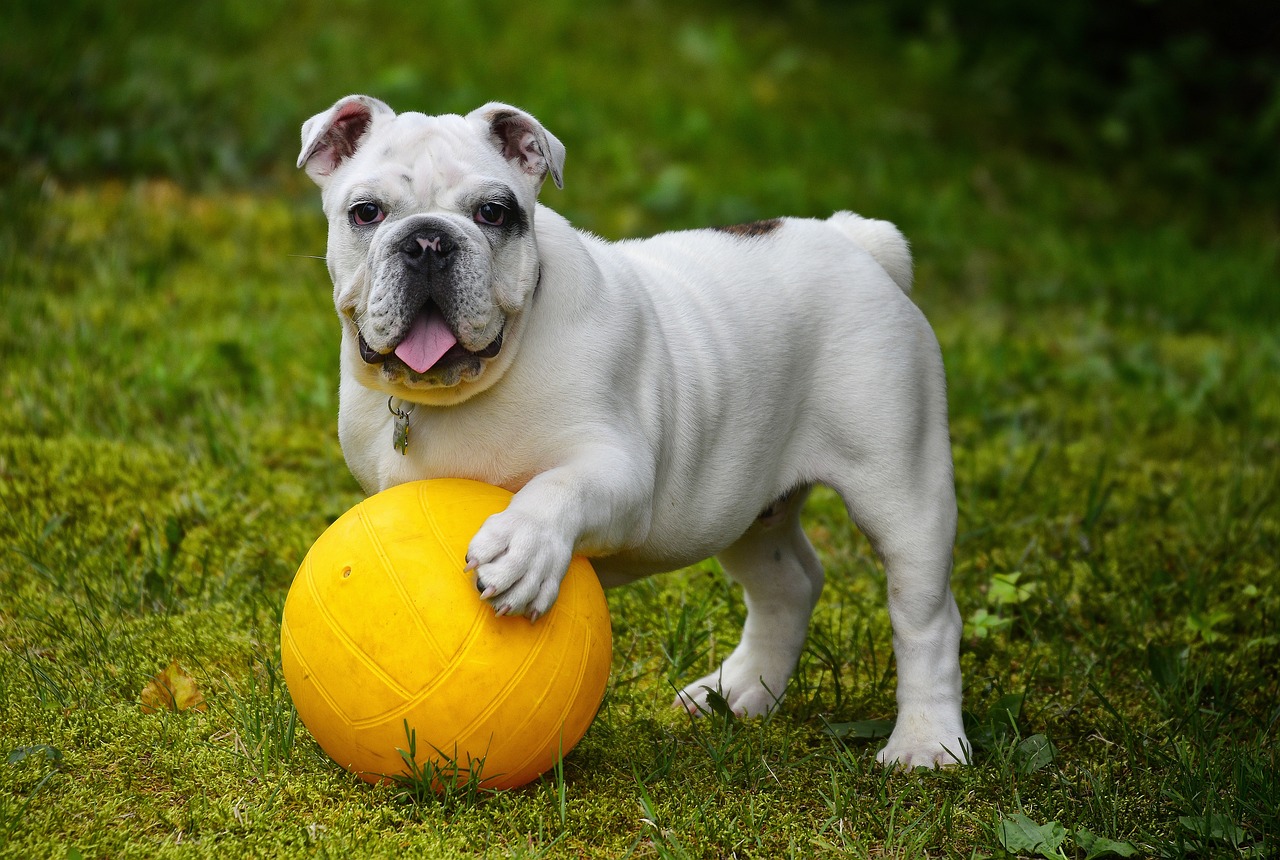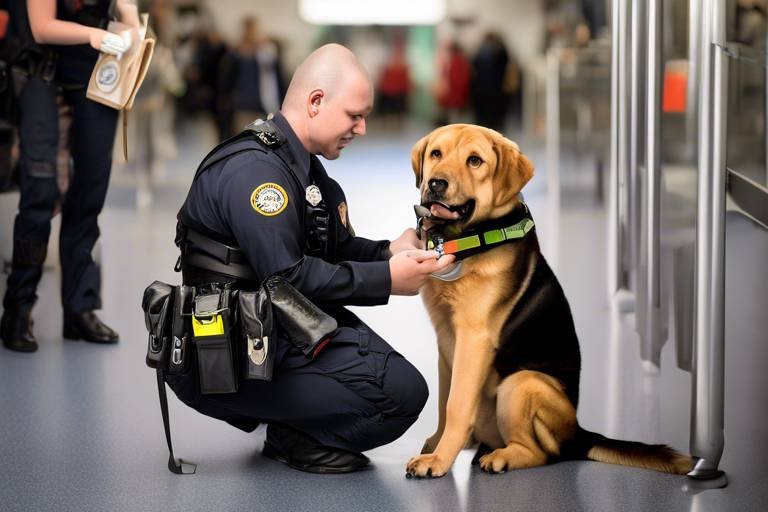Understanding the Role of Genetics in Pet Behavior
Have you ever wondered why your pet behaves the way they do? It's a fascinating topic that dives deep into the intricate world of genetics. Just like humans, pets inherit traits from their parents, and these traits can significantly influence their behavior. In this article, we will explore how genetics plays a crucial role in shaping the temperament, instincts, and interactions of our beloved furry friends.
Genetics isn't just about physical appearance; it extends to behavioral characteristics as well. For instance, certain breeds of dogs are known for their loyalty and playfulness, while others may exhibit more aggressive tendencies. This genetic blueprint provides a foundation upon which a pet's behavior is built. Understanding these genetic influences can be a game changer for pet owners, helping them manage and enhance their pets' behavior effectively.
But wait, there's more! The relationship between genetics and behavior is not a straightforward path. Environmental factors, training, and socialization also play significant roles. Imagine a dog bred for herding: without proper training and exposure to different environments, that dog may struggle to adapt, despite its genetic predisposition to herd. This interplay between genetics and the environment creates a rich tapestry of behaviors that make each pet unique.
As we delve deeper into this topic, we'll uncover the nuances of breed-specific behaviors, the impact of selective breeding, and the fascinating field of epigenetics. So buckle up, because understanding your pet's behavior through the lens of genetics might just change the way you interact with them!
Genetics plays a pivotal role in shaping the behavior of pets, influencing traits such as aggression, sociability, and trainability. It's like having a roadmap that guides how pets respond to various situations. For instance, a breed known for its calm demeanor might be more adaptable to family life, while another breed with a high prey drive might be more suited for active individuals who can provide ample exercise and stimulation.
When considering a pet, it's essential to understand these genetic foundations. They can help you manage and enhance your pet's behavior effectively. By acknowledging their innate tendencies, you can create an environment that fosters positive behavior. For example, if you know your dog has a strong herding instinct, providing them with tasks that allow them to use this skill can lead to a happier, more fulfilled pet.
Different breeds exhibit unique behavioral traits due to selective breeding. This fascinating aspect of genetics is what makes certain breeds so well-suited for specific roles. For example, working breeds like Border Collies are known for their intelligence and energy levels. They thrive in environments where they can be active and engaged, while a breed like the Bulldog may prefer a more laid-back lifestyle.
Understanding these breed-specific behaviors can help potential pet owners make informed decisions. Here are some key points to consider:
- Energy Levels: High-energy breeds require regular exercise and mental stimulation.
- Socialization Needs: Some breeds are more social and thrive on interaction, while others may be more independent.
- Trainability: Certain breeds are easier to train due to their eagerness to please.
Selective breeding has historically aimed to enhance desirable traits in pets, but it can also lead to unintended behavioral consequences. For instance, a breed that has been selectively bred for aggression may develop behavioral issues if not properly managed. This underscores the importance of responsible breeding practices and the need for potential pet owners to research the breed's history and behavioral tendencies.
It's crucial to recognize that while genetics lays the groundwork, the environment in which a pet is raised can significantly influence their behavior. This is where responsible pet ownership comes into play, as providing a loving and structured environment can help mitigate any negative traits that may arise from genetic predispositions.
Dogs have been bred for various purposes, leading to distinct behavioral traits. From the loyal Labrador Retriever to the independent Shiba Inu, each breed comes with its own set of characteristics. Understanding these traits can enhance the bond between you and your pet. For example, a Labrador's friendly nature makes them great family pets, while a German Shepherd's protective instincts can make them excellent guard dogs.
Cats also display breed-specific behaviors influenced by genetics. Some breeds, like the Siamese, are known for their vocal nature and social tendencies, while others, like the Maine Coon, are more laid-back and affectionate. Recognizing these traits can help you create an environment where your cat feels comfortable and happy.
While genetics plays a significant role in pet behavior, environmental factors also contribute. The interplay between genetic predispositions and environmental conditions shapes how pets behave. For example, a dog that is genetically predisposed to be friendly may become fearful if not socialized properly during its early development.
Epigenetics refers to changes in gene expression without altering the DNA sequence. This fascinating field explores how environmental factors can influence genetic expression in pets, affecting their behavior and development. For instance, a pet raised in a nurturing environment may exhibit more positive behaviors than one raised in a stressful situation.
Stressful environments can trigger epigenetic changes that impact behavior. Pets exposed to constant stress may develop anxiety or aggression, highlighting the importance of a stable and loving home. Understanding how stressors affect pets can help owners create a more supportive environment that promotes positive behavior.
Understanding the genetic influences on behavior can enhance training methods. Tailored training approaches can address specific behavioral traits rooted in genetics, promoting positive outcomes for pets. For instance, using positive reinforcement techniques can be particularly effective for breeds known for their eagerness to please.
Q: Can genetics alone determine my pet's behavior?
A: No, while genetics plays a significant role, environmental factors and training also heavily influence behavior.
Q: How can I find out about my pet's genetic background?
A: Many companies offer DNA testing for pets that can provide insights into breed and potential behavioral traits.
Q: Can I change my pet's behavior through training?
A: Yes, with proper training and socialization, you can modify your pet's behavior, regardless of their genetic predispositions.

The Genetic Basis of Behavior
Genetics plays a crucial role in shaping the behavior of pets, influencing traits such as aggression, sociability, and trainability. Just like humans, our furry friends inherit a mix of traits from their ancestors, which can significantly impact how they interact with the world around them. Imagine a dog that barks at every stranger; this could be a result of its genetic makeup, a trait passed down from generations of protective ancestors. Understanding these genetic foundations helps pet owners manage and enhance their pets' behavior effectively.
To dive deeper, let’s consider the various behavioral traits that genetics can influence. These traits can be categorized into several key areas:
- Aggression: Some breeds are more predisposed to aggression due to their genetic history, often stemming from their original purpose, such as guarding or hunting.
- Sociability: Genetics can determine how friendly or aloof a pet may be with strangers and other animals, influencing their social interactions.
- Trainability: Certain breeds are naturally more inclined to learn commands and tricks, making them easier to train.
Understanding these traits is essential for pet owners. For instance, if you have a breed known for being aggressive, recognizing this genetic predisposition allows you to implement training strategies early on, ensuring better behavior as they grow. It's like having a roadmap; knowing where you’re starting from helps you reach your destination more effectively.
Moreover, the genetic basis of behavior extends beyond breed characteristics. Individual pets can exhibit unique behaviors influenced by their specific genetic makeup, even within the same breed. This variability means that two dogs of the same breed can have vastly different personalities. Factors such as lineage, health, and even the presence of certain genes can create a unique behavioral profile for each pet.
In addition to understanding these inherited traits, it's crucial to recognize that genetics doesn't operate in a vacuum. The interaction between genetics and the environment plays a significant role in shaping behavior. For instance, a genetically predisposed shy dog may become more outgoing if raised in a stimulating and social environment. This interplay highlights the importance of nurturing a pet’s environment to complement their genetic tendencies.
In conclusion, the genetic basis of behavior is a fascinating aspect of pet ownership that can greatly influence how we train, interact with, and understand our furry companions. By acknowledging the role of genetics, pet owners can tailor their approaches to better suit their pets' unique needs, ultimately fostering a harmonious relationship.
- Can I change my pet's behavior through training if it's genetically predisposed? Yes, while genetics play a role, training and environment can significantly influence behavior.
- Are all breeds equally trainable? No, some breeds are naturally more trainable due to their genetic background.
- How can I determine my pet's genetic predisposition for certain behaviors? Consulting with a veterinarian or a pet behaviorist can provide insights based on breed characteristics and individual traits.

Breed-Specific Behaviors
When it comes to our furry companions, can be as distinct as the breeds themselves. Just like humans have different personalities shaped by various factors, pets also exhibit unique behavioral traits that are often influenced by their breed. This is not just a coincidence; it's the result of centuries of selective breeding aimed at enhancing certain characteristics. For example, a Border Collie, known for its herding abilities, may display a natural instinct to chase and herd other animals, while a Bulldog may be more laid-back and less inclined to engage in such activities.
Understanding these behaviors is essential for pet owners, as it helps them create an environment that caters to their pets' natural instincts. For instance, active breeds like the Australian Shepherd require plenty of exercise and mental stimulation to thrive. Neglecting these needs can lead to behavioral issues such as excessive barking or destructive tendencies. On the other hand, breeds that are more sedentary, like the Basset Hound, may not need as much physical activity but still require social interaction to prevent boredom.
Moreover, certain breeds have been predisposed to specific behaviors that make them suitable for various roles in human society. For example:
- Working Dogs: Breeds like the German Shepherd and Rottweiler are often used in police and military roles due to their protective instincts and trainability.
- Companion Dogs: Breeds like the Cavalier King Charles Spaniel are bred for their affectionate nature, making them excellent family pets.
- Hunting Dogs: Breeds such as the Beagle and Pointer have strong instincts for tracking and retrieving, making them natural hunters.
It's fascinating to see how these breed-specific traits can affect not just the pet's behavior but also the owner's experience. Recognizing these traits allows pet owners to tailor their training and care approaches effectively. For instance, owners of high-energy breeds may need to incorporate more playtime and agility training, while those with more docile breeds might focus on socialization and gentle play.
However, it’s important to remember that while genetics lays the groundwork for behavior, individual pets can still surprise us. Just like a quiet child might grow up to be a lively performer, a typically calm breed might have an energetic individual. Therefore, understanding breed tendencies can provide valuable insights, but each pet is unique and may not fit perfectly into the mold of their breed's behavioral expectations.
In conclusion, breed-specific behaviors are a fascinating aspect of pet ownership that can significantly influence the relationship between pets and their owners. By understanding these behaviors, owners can create a nurturing environment that aligns with their pets' natural instincts, leading to a happier and more harmonious household.
The Impact of Selective Breeding
Selective breeding has been a cornerstone of domestication for centuries, shaping not only the physical appearance of our beloved pets but also their behavioral traits. By intentionally pairing animals with desirable characteristics, breeders have been able to enhance certain traits while diminishing others. This practice, while beneficial in many ways, also carries significant implications for pet behavior that every pet owner should be aware of. For instance, breeds like the Border Collie were developed for herding, which has made them exceptionally intelligent and trainable. However, this same trait can lead to behavioral issues if their mental stimulation needs are not met.
The consequences of selective breeding can be both positive and negative. On one hand, it allows for the creation of pets that excel in specific roles, such as hunting, guarding, or companionship. On the other hand, it can also lead to behavioral problems if certain traits are overemphasized or if the animals are not raised in suitable environments. For example, breeds known for their high energy levels, like the Jack Russell Terrier, require ample exercise and mental challenges. Without these, they can become destructive or develop anxiety-related behaviors.
Moreover, selective breeding can sometimes lead to a phenomenon known as genetic bottlenecking, where a limited gene pool results in increased susceptibility to health and behavioral issues. This is particularly evident in breeds like the English Bulldog, which, due to their physical characteristics, often face health challenges that can affect their temperament and overall behavior. Understanding these implications is crucial for potential pet owners, as it can help them choose a breed that aligns with their lifestyle and expectations.
In summary, while selective breeding has allowed us to enjoy a diverse range of pets with unique traits, it also necessitates a careful consideration of the behavioral consequences that may arise. As responsible pet owners, it is essential to be informed about the breed-specific behaviors that can influence not only the pet's happiness but also the quality of the human-animal bond.
Behavioral Traits in Dogs
When it comes to our furry friends, dogs are truly remarkable creatures, and their behaviors can be as diverse as the breeds themselves. Each breed has been shaped over generations through selective breeding, which has resulted in distinct behavioral traits that are often tied to their original purposes. For instance, working breeds like Border Collies are known for their intelligence and high energy levels, making them excellent herders, while breeds like Bulldogs tend to be more laid-back and affectionate, perfectly suited for companionship.
One of the most fascinating aspects of dog behavior is how these traits manifest in everyday life. A Labrador Retriever, bred for retrieving game, often exhibits a love for water and a playful demeanor, making them fantastic family pets. On the other hand, a Chihuahua may display a more protective nature, often bonding closely with their owners and being wary of strangers. These behavioral traits can significantly influence how dogs interact with humans and other animals, shaping their roles in our lives.
Moreover, understanding these traits can help pet owners create a harmonious environment for their dogs. For example, an energetic breed like the Australian Shepherd requires ample physical and mental stimulation to prevent boredom, which could lead to destructive behaviors. In contrast, a more sedentary breed, such as the Shih Tzu, may thrive in a quieter home environment where they can enjoy leisurely walks and cozy cuddles.
In addition to breed-specific traits, individual personality plays a crucial role. Just like humans, dogs have their own unique quirks and temperaments. Some may be naturally more sociable, while others might be shy or reserved. This individuality can be influenced by both genetics and early socialization experiences. A well-socialized puppy is likely to grow into a confident adult dog, whereas one that has had limited exposure to different environments may exhibit fear-based behaviors.
| Breed | Common Behavioral Traits |
|---|---|
| Labrador Retriever | Friendly, energetic, loves water |
| German Shepherd | Intelligent, protective, loyal |
| Beagle | Curious, friendly, great sense of smell |
| Bulldog | Laid-back, affectionate, good with children |
Ultimately, understanding the behavioral traits of different dog breeds not only enriches our bond with them but also helps us tailor our training and care approaches. By recognizing their instincts and needs, we can create a nurturing environment that allows them to thrive, ensuring that our canine companions lead happy, fulfilled lives.
- What are the most common behavioral issues in dogs? Common issues include aggression, separation anxiety, and excessive barking.
- Can training change a dog's behavior? Yes, consistent training can significantly modify undesirable behaviors and enhance positive traits.
- Are certain breeds more prone to behavioral problems? Yes, some breeds may be predisposed to specific behavioral issues due to their genetics and history.
- How important is socialization for puppies? Socialization is crucial; it helps puppies develop into well-adjusted adult dogs.
Behavioral Traits in Cats
Cats are fascinating creatures, and their behavioral traits can often leave us scratching our heads in wonder. Unlike dogs, whose behaviors are often more predictable and aligned with their roles as companions, cats exhibit a range of unique characteristics that are deeply influenced by their genetics. For instance, certain breeds have been selectively bred for specific traits, leading to behaviors that can be quite distinct. For example, the Siamese is known for its vocal nature and social tendencies, while the Maine Coon is often more laid-back and independent. These differences can affect how they interact with humans and other pets in the household.
One of the most intriguing aspects of feline behavior is their strong instinctual drives. Cats are natural hunters, and even the most pampered house cat will display hunting behaviors such as stalking and pouncing. This is particularly evident in breeds like the Bengal and the Oriental Shorthair, which tend to exhibit higher energy levels and a strong need for play that mimics hunting. It's essential for cat owners to understand these instincts, as they can impact a cat's behavior significantly. Providing appropriate outlets for these instincts—like interactive toys or climbing structures—can help keep a cat mentally stimulated and physically active.
Moreover, the social dynamics of cats can vary widely based on their genetic background. Some breeds, like the Ragdoll, are known for their affectionate nature and desire to be around people, often following their owners from room to room. In contrast, breeds like the Persian may exhibit a more aloof demeanor, preferring solitude to constant human interaction. Understanding these nuances can help pet owners tailor their approach to their cats' needs, ensuring a harmonious living environment.
To further illustrate the behavioral traits in cats, consider the following table, which summarizes some common traits associated with various breeds:
| Breed | Common Behavioral Traits |
|---|---|
| Siamese | Vocal, social, and affectionate |
| Maine Coon | Laid-back, friendly, and playful |
| Bengal | Active, curious, and playful |
| Persian | Aloof, calm, and independent |
| Ragdoll | Gentle, affectionate, and relaxed |
Additionally, it's crucial to recognize that while genetics lays the foundation for many behaviors, environmental factors also play a significant role in shaping a cat’s personality. A cat that is raised in a stimulating environment with plenty of social interaction is likely to develop different behavioral traits than one that is isolated or neglected. This interplay between genetics and environment is what makes each cat unique, and understanding it can lead to a more fulfilling relationship between pets and their owners.
- Do all cats have the same behavioral traits? No, different breeds of cats exhibit varying behavioral traits influenced by genetics.
- How can I understand my cat's behavior better? Observing your cat's interactions and providing an environment that caters to their instincts can help.
- Are behavioral traits in cats solely genetic? While genetics play a significant role, environmental factors also greatly influence behavior.
- Can I change my cat's behavior? With patience and appropriate training techniques, you can modify certain behaviors in your cat.
Genetic vs. Environmental Influences
When it comes to understanding pet behavior, the age-old debate between genetics and environment is as complex as it is fascinating. Think of it like a recipe: genetics provide the ingredients, while the environment sets the cooking conditions. Just as a soufflé can flop if not baked at the right temperature, a pet's behavior can be significantly influenced by its surroundings. Genetics lays the groundwork for certain predispositions, but environmental factors can either amplify or dampen those traits.
Many pet owners might wonder, "Is my dog naturally aggressive, or is it a result of its upbringing?" The truth is, both factors play a role. For instance, a dog with a genetic predisposition to be protective may become overly aggressive if raised in a stressful or abusive environment. Conversely, a well-socialized dog, even if it has a genetic inclination toward shyness, can blossom into a friendly companion. The interaction between these two influences is crucial in shaping behavior.
To further illustrate this point, let’s consider a few examples:
- Genetic Traits: Certain breeds have been selectively bred for specific traits. For instance, Border Collies are known for their intelligence and herding instincts, while Chihuahuas often exhibit a feisty temperament.
- Environmental Factors: A dog raised in a loving home with plenty of socialization opportunities is likely to be more well-adjusted than one that has been isolated or neglected, even if both dogs share similar genetic backgrounds.
Moreover, the impact of the environment extends beyond just the home. Factors like early socialization, exposure to different people and animals, and even the owner's behavior can significantly affect how a pet's genetic traits are expressed. For example, a cat that has been exposed to various stimuli, such as visitors and other pets, is likely to be more adaptable and less fearful than one that has been kept in a quiet, isolated environment.
Furthermore, research indicates that stress levels in pets can lead to changes in behavior that may not directly correlate with their genetic makeup. For instance, a high-stress environment can trigger anxiety-related behaviors in a pet, which may not have been evident in a more relaxed setting. This highlights the importance of providing a nurturing and stable environment to help pets thrive.
In conclusion, while genetics undoubtedly plays a significant role in shaping pet behavior, it is essential to recognize the profound impact of environmental influences. By understanding this interplay, pet owners can create a balanced approach to training and care that considers both inherent traits and external factors. This holistic view not only aids in better behavior management but also enhances the overall well-being of our furry companions.
- Can genetics alone determine my pet's behavior?
No, while genetics play a crucial role, environmental factors also significantly influence behavior. - How can I improve my pet's behavior?
Focus on positive reinforcement training and create a stable, loving environment for your pet. - Are some breeds more prone to behavioral issues?
Yes, certain breeds may have predispositions to specific behaviors due to selective breeding practices.

The Role of Epigenetics
When we talk about the behavior of our beloved pets, we often think of genetics as the primary player. But there's a fascinating twist to the story: epigenetics. This term refers to changes in gene expression that occur without altering the actual DNA sequence. Imagine it as a dimmer switch on a light; the lightbulb (your DNA) remains the same, but how bright it shines (gene expression) can change based on various factors, particularly the environment.
Epigenetics plays a crucial role in how our pets react to their surroundings and how they develop over time. For instance, a puppy born to a calm mother may inherit genes that predispose it to being laid-back. However, if that puppy is raised in a chaotic, stressful environment, the epigenetic changes can turn that calmness down a notch, leading to increased anxiety or aggression. It’s like having a well-tuned instrument that gets out of tune due to the noise around it.
To illustrate, let’s consider some common environmental factors that can influence epigenetic changes in pets:
- Nutrition: The quality of food can affect gene expression. A well-balanced diet can enhance positive behaviors, while a poor diet might lead to behavioral issues.
- Stress: High-stress situations can trigger epigenetic changes that lead to anxiety and fear-based behaviors.
- Socialization: Early interactions with humans and other animals can shape how genes are expressed, influencing sociability and aggression.
These environmental triggers can lead to a cascade of effects on behavior. For example, a dog that experiences frequent loud noises may develop a heightened startle response, which can be traced back to epigenetic changes triggered by its environment. This shows us that while genetics lays the groundwork, the environment can build the house—or tear it down.
Moreover, understanding the role of epigenetics gives pet owners a powerful tool to enhance their pets' lives. By creating a safe and nurturing environment, we can help ensure that our pets express their best genetic traits. This could mean providing a stable home, regular exercise, and positive social interactions. Just like a garden needs the right conditions to flourish, our pets thrive when their environmental needs are met.
In summary, epigenetics adds an exciting layer to our understanding of pet behavior. It reminds us that while genetics is important, the environment can significantly shape how those genetic traits manifest. So, as pet owners, we have the responsibility and the opportunity to create environments that promote positive behavior and overall well-being for our furry friends.
- What is epigenetics? Epigenetics refers to changes in gene expression that do not involve alterations to the underlying DNA sequence, often influenced by environmental factors.
- How does epigenetics affect my pet's behavior? Environmental factors such as stress, nutrition, and socialization can trigger epigenetic changes that influence how your pet behaves.
- Can I reverse negative epigenetic changes in my pet? While some epigenetic changes can be long-lasting, creating a positive and nurturing environment can help promote better behavior and potentially reverse some negative effects.
Stress and Behavior
Stress is a powerful force that can significantly impact the behavior of our beloved pets. Just like humans, animals can experience stress in various forms, whether it's due to environmental changes, loud noises, or even the introduction of new family members. When pets are subjected to stressful situations, their behavior can change dramatically, leading to issues such as aggression, anxiety, or withdrawal. It's essential for pet owners to recognize these signs and understand the underlying causes of stress in their furry friends.
One of the most intriguing aspects of stress is its ability to trigger epigenetic changes. These changes can alter how genes are expressed without modifying the DNA sequence itself. For instance, a dog that faces constant stress may develop a heightened response to fear or anxiety, which can become ingrained in its behavior. This means that even if the stressful situation is resolved, the pet may continue to exhibit stress-related behaviors. The long-term implications of such changes can affect the pet's overall well-being and quality of life.
It's also important to note that different pets react to stress in various ways. For example:
- Dogs: They may bark excessively, chew furniture, or show signs of aggression.
- Cats: They might hide, stop eating, or exhibit litter box issues.
Understanding these stress responses is crucial for pet owners. By identifying the stressors in a pet's environment, owners can implement strategies to mitigate these effects. For example, creating a calm and safe space for a pet can help alleviate anxiety and promote a sense of security. Additionally, regular exercise and mental stimulation can serve as excellent outlets for stress relief, allowing pets to channel their energy positively.
Moreover, behavior modification techniques can be tailored to address stress-related issues. For instance, desensitization training can help pets gradually adapt to stressors, reducing their intensity over time. This approach not only improves a pet's behavior but also strengthens the bond between the pet and its owner, as they work together to overcome challenges.
In summary, stress plays a pivotal role in shaping a pet's behavior. By recognizing the signs of stress, understanding its effects, and implementing effective strategies, pet owners can create a nurturing environment that promotes positive behavior and overall well-being. Remember, a happy pet is a healthy pet!
- What are common signs of stress in pets? Pets may show signs of stress through changes in behavior, such as excessive barking, hiding, or aggression.
- How can I reduce stress for my pet? Creating a safe space, providing regular exercise, and using calming techniques can help reduce stress.
- Can stress affect my pet's health? Yes, prolonged stress can lead to health issues, including anxiety disorders and physical ailments.
Training and Behavior Modification
When it comes to , understanding the genetic influences on a pet's behavior can be a game-changer. After all, just like humans, pets come with their own unique set of traits and tendencies, shaped by their genetic makeup. This means that a dog's or cat's natural instincts can either help or hinder the training process. For example, some breeds are naturally more eager to please, while others may exhibit stubbornness that can complicate training efforts.
It's essential to recognize that training isn't just about teaching commands; it’s about building a relationship based on trust and understanding. When you take the time to understand your pet's genetic predispositions, you can tailor your training methods to better suit their needs. For instance, if you have a breed known for high energy and playfulness, incorporating physical activities and mental challenges into your training sessions can yield better results. This approach not only utilizes their natural traits but also keeps them engaged and motivated.
Moreover, the concept of positive reinforcement plays a vital role in behavior modification. By rewarding desired behaviors with treats, praise, or playtime, you can encourage your pet to repeat those behaviors. This method is particularly effective for pets that may be genetically predisposed to certain behaviors, such as aggression or anxiety. For instance, if a dog shows signs of aggression towards other animals, using positive reinforcement to reward calm behavior around them can gradually help modify that response.
On the flip side, understanding the genetic factors at play can also help identify potential behavioral issues before they escalate. For example, certain breeds may be more prone to anxiety or fearfulness. By recognizing these traits early on, pet owners can implement training strategies that focus on building confidence and reducing stress. This proactive approach can significantly improve a pet's quality of life and strengthen the bond between pet and owner.
In addition to traditional training methods, exploring behavioral therapies can also be beneficial. Techniques such as desensitization and counter-conditioning can help pets overcome specific fears or undesirable behaviors. For instance, if a dog is genetically predisposed to fear loud noises, gradual exposure to those sounds in a controlled environment, paired with positive reinforcement, can help them adjust and respond more calmly over time.
Ultimately, the key to successful training and behavior modification lies in a combination of understanding genetic influences and applying effective training techniques. By doing so, pet owners can create a harmonious environment where their pets can thrive, showcasing their best behaviors while minimizing challenges. Remember, every pet is unique, and what works for one may not work for another. So, stay patient and flexible, and watch your furry friend blossom!
- Q: Can genetics really influence my pet's behavior?
A: Yes, genetics plays a significant role in shaping behavioral traits, including aggression, sociability, and trainability. - Q: How can I modify my pet's behavior?
A: Understanding your pet's genetic predispositions can help tailor training methods, such as using positive reinforcement and behavioral therapies. - Q: What is the best training method for my pet?
A: The best training method depends on your pet's unique traits. Positive reinforcement is generally effective, but consider their breed-specific tendencies. - Q: Are certain breeds easier to train than others?
A: Yes, some breeds are naturally more eager to please and may respond better to training than others that are more independent or stubborn.
Frequently Asked Questions
- How do genetics influence my pet's behavior?
Genetics significantly shapes your pet's behavior by determining traits like aggression, sociability, and trainability. Just like humans inherit personality traits from their parents, pets also carry genetic predispositions that influence how they interact with their environment and other beings.
- Are certain breeds more prone to specific behaviors?
Absolutely! Different breeds have been selectively bred for particular traits, which can lead to unique behavioral tendencies. For example, herding breeds might display strong instincts to chase and gather, while toy breeds often exhibit more sociable and affectionate behaviors. It's essential to understand these traits when choosing a pet that fits your lifestyle.
- What is the impact of selective breeding on behavior?
Selective breeding can enhance desirable traits, but it can also lead to behavioral issues in some breeds. Over time, certain traits may become exaggerated, potentially resulting in anxiety or aggression if not managed properly. Understanding these implications can help pet owners better prepare for the needs of their pets.
- Can environmental factors change my pet's behavior?
Yes, environmental factors play a crucial role in shaping behavior alongside genetics. A pet raised in a stimulating and loving environment may develop different behavioral traits compared to one in a stressful or neglectful setting. The interaction between genetic predispositions and environmental influences is key to understanding your pet's behavior.
- What is epigenetics, and how does it affect my pet?
Epigenetics involves changes in gene expression that don't alter the DNA sequence itself. Environmental factors, such as stress or diet, can trigger these changes, affecting your pet's behavior and development. This means that even if a pet has a genetic predisposition, their environment can significantly impact how these traits manifest.
- How does stress affect my pet's behavior?
Stressful environments can lead to epigenetic changes that may adversely affect your pet's behavior. Pets under stress may exhibit anxiety, aggression, or withdrawal. Recognizing and mitigating stressors in your pet's environment is vital for their overall well-being and behavioral health.
- Can I modify my pet's behavior through training?
Yes! Understanding the genetic influences on your pet's behavior can enhance your training methods. Tailoring training approaches to address specific traits rooted in genetics can lead to more effective behavior modification. Positive reinforcement and consistent training can help shape your pet's behavior in a desirable direction.



















